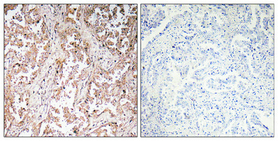UCP2 Polyclonal Antibody
- SPECIFICATION
- CITATIONS
- PROTOCOLS
- BACKGROUND

Application
| IHC-P |
|---|---|
| Primary Accession | P55851 |
| Reactivity | Human, Mouse, Rat |
| Host | Rabbit |
| Clonality | Polyclonal |
| Calculated MW | 33229 Da |
| Gene ID | 7351 |
|---|---|
| Other Names | UCP2; SLC25A8; Mitochondrial uncoupling protein 2; UCP 2; Solute carrier family 25 member 8; UCPH |
| Dilution | IHC-P~~N/A |
| Format | Liquid in PBS containing 50% glycerol, 0.5% BSA and 0.09% (W/V) sodium azide. |
| Storage Conditions | -20℃ |
| Name | UCP2 |
|---|---|
| Synonyms | SLC25A8 {ECO:0000303|PubMed:33798544} |
| Function | Antiporter that exports dicarboxylate intermediates of the Krebs cycle in exchange for phosphate plus a proton across the inner membrane of mitochondria, a process driven by mitochondrial motive force with an overall impact on glycolysis, glutaminolysis and glutathione-dependent redox balance. Continuous export of oxaloacetate and related four-carbon dicarboxylates from mitochondrial matrix into the cytosol negatively regulates the oxidation of acetyl-CoA substrates via the Krebs cycle, lowering the ATP/ADP ratio and reactive oxygen species (ROS) production (PubMed:24395786). May mediate inducible proton entry into the mitochondrial matrix affecting ATP turnover as a protection mechanism against oxidative stress. The proton currents are most likely associated with fatty acid flipping across the inner membrane of mitochondria in a metabolic process regulated by free fatty acids and purine nucleotides (By similarity) (PubMed:11171965, PubMed:11278935, PubMed:22524567, PubMed:26182433, PubMed:33373220). Regulates the use of glucose as a source of energy. Required for glucose-induced DRP1-dependent mitochondrial fission and neuron activation in the ventromedial nucleus of the hypothalamus (VMH). This mitochondrial adaptation mechanism modulates the VMH pool of glucose- excited neurons with an impact on systemic glucose homeostasis (By similarity). Regulates ROS levels and metabolic reprogramming of macrophages during the resolution phase of inflammation. Attenuates ROS production in response to IL33 to preserve the integrity of the Krebs cycle required for persistent production of itaconate and subsequent GATA3-dependent differentiation of inflammation-resolving alternatively activated macrophages (By similarity). Can unidirectionally transport anions including L-malate, L-aspartate, phosphate and chloride ions (PubMed:22524567, PubMed:24395786, PubMed:26182433). Does not mediate adaptive thermogenesis (By similarity). |
| Cellular Location | Mitochondrion inner membrane {ECO:0000250|UniProtKB:P70406}; Multi-pass membrane protein |
| Tissue Location | Widely expressed in adult human tissues, including tissues rich in macrophages. Most expressed in white adipose tissue and skeletal muscle. |

Thousands of laboratories across the world have published research that depended on the performance of antibodies from Abcepta to advance their research. Check out links to articles that cite our products in major peer-reviewed journals, organized by research category.
info@abcepta.com, and receive a free "I Love Antibodies" mug.
Provided below are standard protocols that you may find useful for product applications.
Background
UCP are mitochondrial transporter proteins that create proton leaks across the inner mitochondrial membrane, thus uncoupling oxidative phosphorylation from ATP synthesis. As a result, energy is dissipated in the form of heat.
If you have used an Abcepta product and would like to share how it has performed, please click on the "Submit Review" button and provide the requested information. Our staff will examine and post your review and contact you if needed.
If you have any additional inquiries please email technical services at tech@abcepta.com.













 Foundational characteristics of cancer include proliferation, angiogenesis, migration, evasion of apoptosis, and cellular immortality. Find key markers for these cellular processes and antibodies to detect them.
Foundational characteristics of cancer include proliferation, angiogenesis, migration, evasion of apoptosis, and cellular immortality. Find key markers for these cellular processes and antibodies to detect them. The SUMOplot™ Analysis Program predicts and scores sumoylation sites in your protein. SUMOylation is a post-translational modification involved in various cellular processes, such as nuclear-cytosolic transport, transcriptional regulation, apoptosis, protein stability, response to stress, and progression through the cell cycle.
The SUMOplot™ Analysis Program predicts and scores sumoylation sites in your protein. SUMOylation is a post-translational modification involved in various cellular processes, such as nuclear-cytosolic transport, transcriptional regulation, apoptosis, protein stability, response to stress, and progression through the cell cycle. The Autophagy Receptor Motif Plotter predicts and scores autophagy receptor binding sites in your protein. Identifying proteins connected to this pathway is critical to understanding the role of autophagy in physiological as well as pathological processes such as development, differentiation, neurodegenerative diseases, stress, infection, and cancer.
The Autophagy Receptor Motif Plotter predicts and scores autophagy receptor binding sites in your protein. Identifying proteins connected to this pathway is critical to understanding the role of autophagy in physiological as well as pathological processes such as development, differentiation, neurodegenerative diseases, stress, infection, and cancer.


